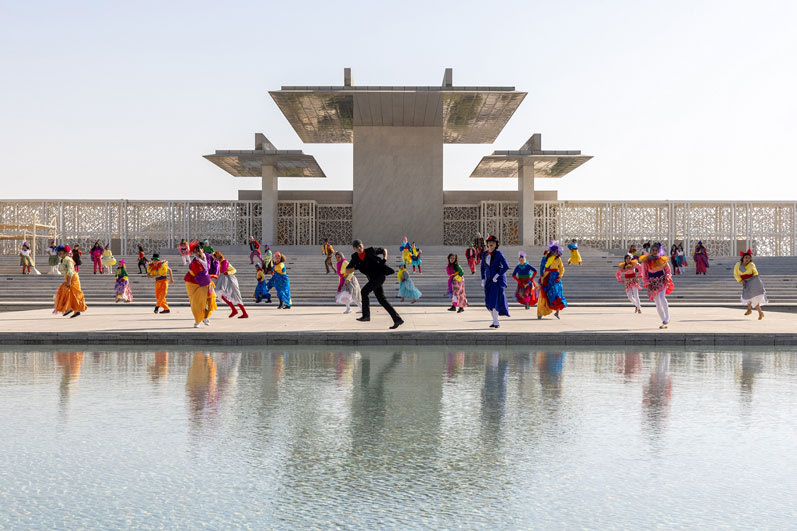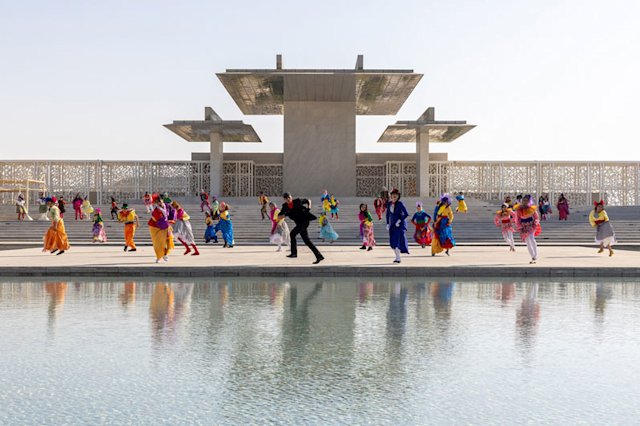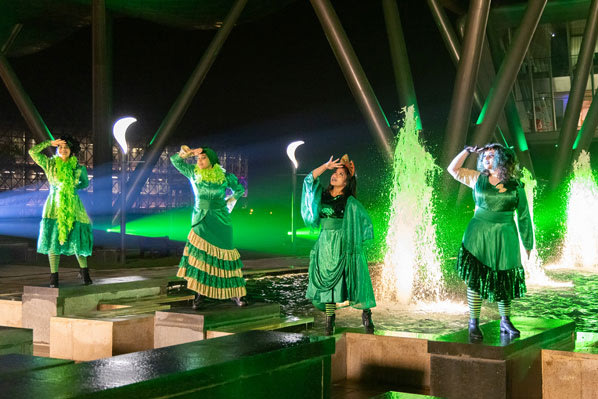The Power of Youth
For 10 years, THIMUN Qatar has been empowering young people from high schools in Qatar and from around the region to find their voice on the biggest challenges and issues shaping our world.
Under Qatar Foundation’s (QF) Pre-University Education, the Model United Nations program nurtures global citizens and advocates for change whose discussions, debates, and actions aim to unlock solutions to society’s problems.
And as THIMUN Qatar marked its 10th anniversary in virtual form, more than 600 delegates from seven countries gathered for a showcase of student agency that focused on perhaps the world’s most urgent challenge: climate change. Under the banner of THIMUN Qatar X – Climate Action, its annual conference reached a series of resolutions on the climate emergency, to be taken forward to influential bodies.
“I hear well-meaning and well-intentioned adults and diplomats say the youth are the future, but the reality is that the youth are today,” said Robin Gupta, THIMUN Qatar X Co-Secretary General.
“We don’t have to wait until we are adults to make a difference. We can start now.”
For 10 years, THIMUN Qatar has been empowering young people from high schools in Qatar and from around the region to find their voice on the biggest challenges and issues shaping our world.
Under Qatar Foundation’s (QF) Pre-University Education, the Model United Nations program nurtures global citizens and advocates for change whose discussions, debates, and actions aim to unlock solutions to society’s problems.
And as THIMUN Qatar marked its 10th anniversary in virtual form, more than 600 delegates from seven countries gathered for a showcase of student agency that focused on perhaps the world’s most urgent challenge: climate change. Under the banner of THIMUN Qatar X – Climate Action, its annual conference reached a series of resolutions on the climate emergency, to be taken forward to influential bodies.
“I hear well-meaning and well-intentioned adults and diplomats say the youth are the future, but the reality is that the youth are today,” said Robin Gupta, THIMUN Qatar X Co-Secretary General.
“We don’t have to wait until we are adults to make a difference. We can start now.”
From debating crucial climate issues to setting a sustainable example in their schools, young members of the QF community demonstrated their determination to help address the biggest challenge facing their generation.
More than 600 delegates from 7 countries attended THIMUN Qatar
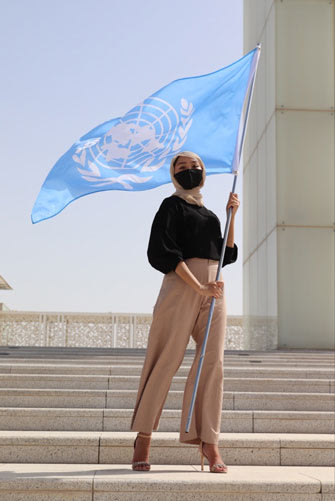

Schools for Sustainability
Students at QF flew the flag for sustainability in April as their schools – Qatar Academy Doha (QAD) Primary and Qatar Leadership Academy (QLA) – were recognized for their commitment to protecting the environment.
The two schools were awarded the Eco-Schools Green Flag by QF member Qatar Green Building Council, making them the first QF schools to receive this accolade – which takes two years to earn and requires seven stringent criteria to be met, from forming an eco-committee and developing an Eco Code, to incorporating sustainability in the curriculum.
“These children can lead today, if we empower their voice and allow them the agency to share their passion and foster that growth,” said Elizabeth Kennedy, Well-being Facilitator at QAD. “They have a voice, and they have a passion. Our job as educators is to foster that.”
And QLA Director Jamal Al-Shammari said of the Eco-Schools award: “It is the result of a lot of hard work from our students and teachers, who are striving to highlight the importance of environmental sustainability and water conservation, as well as to mitigate climate change.”
Students at QF flew the flag for sustainability in April as their schools – Qatar Academy Doha (QAD) Primary and Qatar Leadership Academy (QLA) – were recognized for their commitment to protecting the environment.
The two schools were awarded the Eco-Schools Green Flag by QF member Qatar Green Building Council, making them the first QF schools to receive this accolade – which takes two years to earn and requires seven stringent criteria to be met, from forming an eco-committee and developing an Eco Code, to incorporating sustainability in the curriculum.
“These children can lead today, if we empower their voice and allow them the agency to share their passion and foster that growth,” said Elizabeth Kennedy, Well-being Facilitator at QAD. “They have a voice, and they have a passion. Our job as educators is to foster that.”
And QLA Director Jamal Al-Shammari said of the Eco-Schools award: “It is the result of a lot of hard work from our students and teachers, who are striving to highlight the importance of environmental sustainability and water conservation, as well as to mitigate climate change.”
These children can lead today, if we empower their voice and allow them the agency to share their passion and foster that growth
Qatar Leadership Academy has 149 students in the 2021-22 academic year
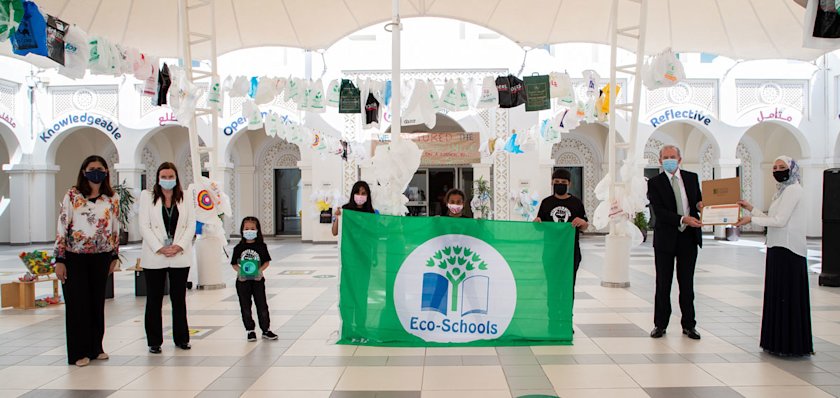
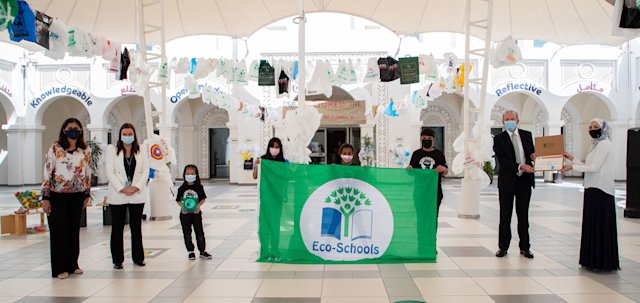
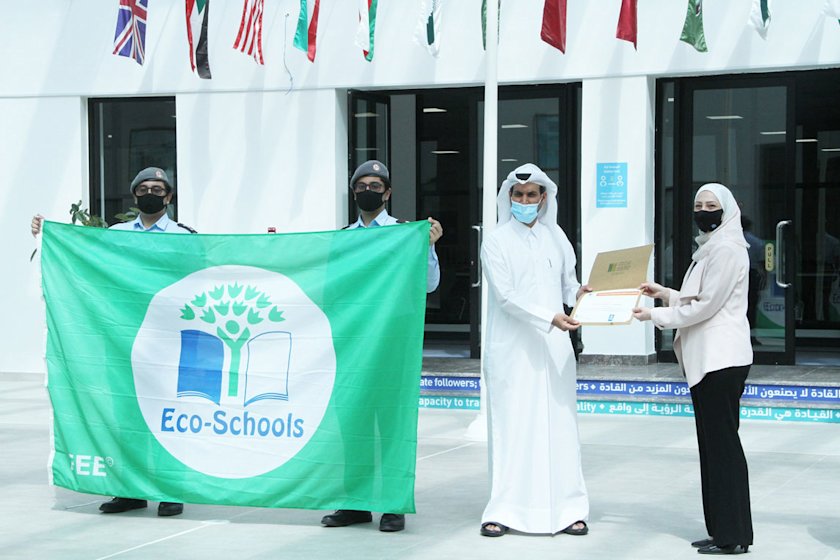
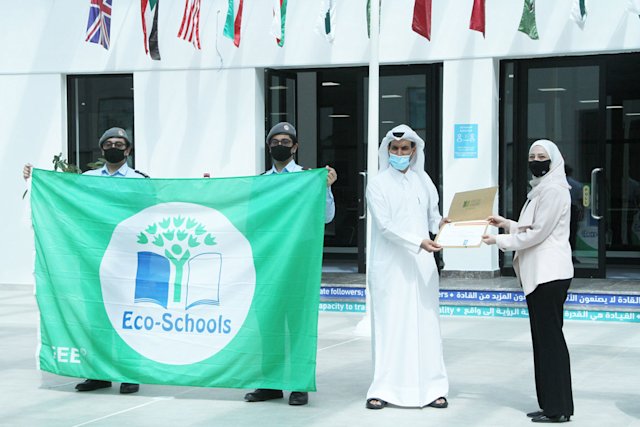
Debating the Planet
Sustainability was the focus of one of the year’s flagship events for QF’s QatarDebate, which equips young people with the dialogue and critical thinking skills that broaden their perspectives and inspire them to look at global issues through fresh eyes.
Its Fifth International Schools Debating Championship unfolded in April under the slogan ‘Our Earth, Our Refuge’, and broke new ground by being held in both Arabic and English for the first time. School teams from 50 countries participated in each category.
According to Abdulrahman Al-Subaie, Outreach Programs Manager, QatarDebate, the championship was designed to “expose young debaters to the issue of sustainability in a critical way”. And speaking about the tournament’s dual-language nature, he said: “QatarDebate has succeeded in being a flag-carrier for the Arabic language around the world, and we are continuing to reach new student communities who are interested in learning the Arabic language in Asia, Europe, and America.
“We decided that adding the English language as a new category in the competition will further enrich dialogue and contribute to our mission of building future leaders.”
Sustainability was the focus of one of the year’s flagship events for QF’s QatarDebate, which equips young people with the dialogue and critical thinking skills that broaden their perspectives and inspire them to look at global issues through fresh eyes.
Its Fifth International Schools Debating Championship unfolded in April under the slogan ‘Our Earth, Our Refuge’, and broke new ground by being held in both Arabic and English for the first time. School teams from 50 countries participated in each category.
According to Abdulrahman Al-Subaie, Outreach Programs Manager, QatarDebate, the championship was designed to “expose young debaters to the issue of sustainability in a critical way”. And speaking about the tournament’s dual-language nature, he said: “QatarDebate has succeeded in being a flag-carrier for the Arabic language around the world, and we are continuing to reach new student communities who are interested in learning the Arabic language in Asia, Europe, and America.
“We decided that adding the English language as a new category in the competition will further enrich dialogue and contribute to our mission of building future leaders.”
We are continuing to reach new student communities who are interested in learning the Arabic language in Asia, Europe, and America
Schools from 50 countries participated in QatarDebate’s Fifth International Schools Debating Championship
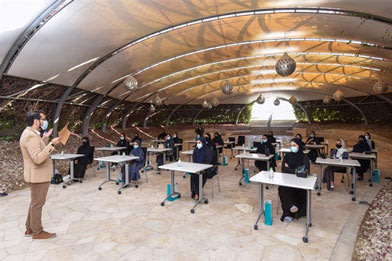

Mapping a Solar Path
A significant step toward accelerating the use of solar energy in Qatar was taken in April as QF member Hamad Bin Khalifa University’s (HBKU) Qatar Environment and Energy Research Institute (QEERI) launched the first Qatar Solar Atlas.
Developed over five years, the atlas brings together vast amounts of data about Qatar’s solar resources and their geographical distribution; information that is vital if solar energy is to be converted into usable energy such as electricity in an economically viable way.
“Qatar is at the heart of the global solar belt and is blessed with abundant solar energy, and the solar map is the first step toward optimizing the use of these resources,” said Dr. Veronica Bermudez, Senior Research Director at QEERI’s Energy Center.
For another HBKU research center, Qatar Biomedical Research Institute, April saw a collaboration being sealed with medical support systems developer Argus Cognitive, together with Rush University in Chicago, which will see them work together on a project using machine learning and Artificial Intelligence technologies to create a diagnostic tool for early detection and diagnosis of autism.
A significant step toward accelerating the use of solar energy in Qatar was taken in April as QF member Hamad Bin Khalifa University’s (HBKU) Qatar Environment and Energy Research Institute (QEERI) launched the first Qatar Solar Atlas.
Developed over five years, the atlas brings together vast amounts of data about Qatar’s solar resources and their geographical distribution; information that is vital if solar energy is to be converted into usable energy such as electricity in an economically viable way.
“Qatar is at the heart of the global solar belt and is blessed with abundant solar energy, and the solar map is the first step toward optimizing the use of these resources,” said Dr. Veronica Bermudez, Senior Research Director at QEERI’s Energy Center.
For another HBKU research center, Qatar Biomedical Research Institute, April saw a collaboration being sealed with medical support systems developer Argus Cognitive, together with Rush University in Chicago, which will see them work together on a project using machine learning and Artificial Intelligence technologies to create a diagnostic tool for early detection and diagnosis of autism.
Qatar is at the heart of the global solar belt and is blessed with abundant solar energy, and the solar map is the first step toward optimizing the use of these resources
QEERI focuses on:
- Climate change and atmospheric science
- Solar photovoltaics
- Energy storage technologies
- Smart grids
- Water desalination
- Water quality and reuse
- Aquifer recharge
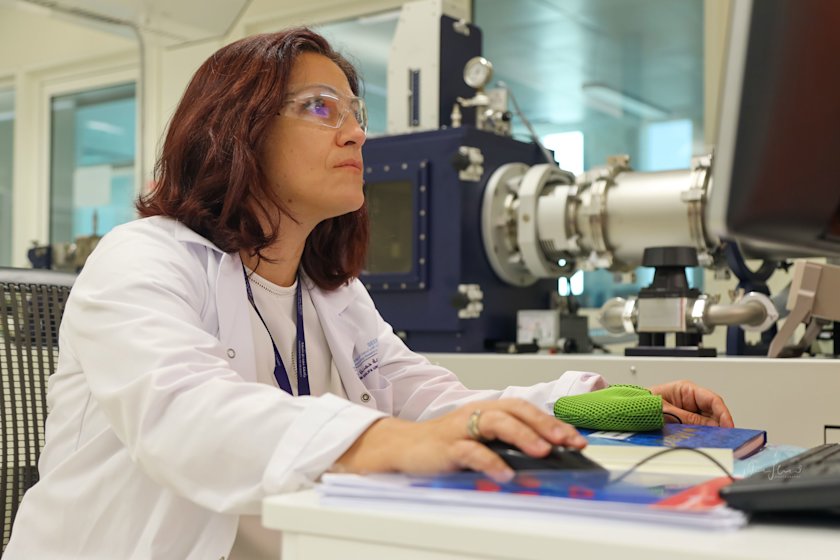
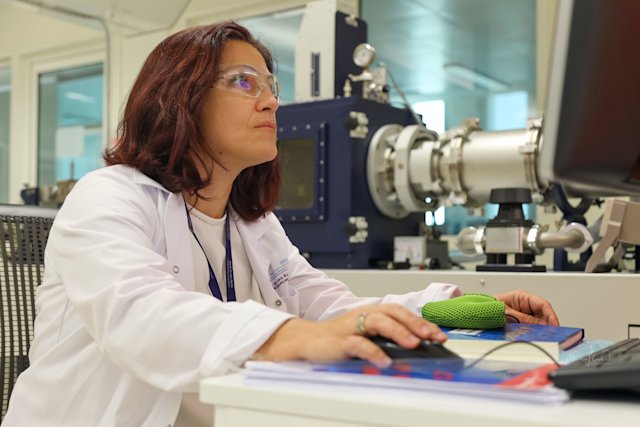
Art, Identity, and Wellness
While children may have been largely shielded from the physical effects of COVID-19, lockdowns – and the social isolation and lack of interaction they create – are considered to have affected their mental health more than adults.
Against this backdrop, QF partner university Weill Cornell Medicine-Qatar collaborated with the National Museum of Qatar (NMoQ) to develop a pilot program in Museums Telehealth Art Therapy, designed to address symptoms of depression, anxiety, and stress among youth while also reconnecting them with their ancestral roots.
Funded by QF’s Qatar National Research Fund (QNRF), one of the themes the project focuses on is national identity, using NMoQ’s artefacts to allow children and young people to explore their cultural heritage, while also countering the effects of social distancing and isolation.
“Because of the rapid urbanization of the country, many youth today feel disconnected from their past and ancestors,” said WCM-Q Professor Dr. Alan Weber, an arts-in-health specialist who is leading the project. “This is why we chose the theme of national identity, and the collaboration with NMoQ will be very valuable in helping us bring this theme to life.”
While children may have been largely shielded from the physical effects of COVID-19, lockdowns – and the social isolation and lack of interaction they create – are considered to have affected their mental health more than adults.
Against this backdrop, QF partner university Weill Cornell Medicine-Qatar collaborated with the National Museum of Qatar (NMoQ) to develop a pilot program in Museums Telehealth Art Therapy, designed to address symptoms of depression, anxiety, and stress among youth while also reconnecting them with their ancestral roots.
Funded by QF’s Qatar National Research Fund (QNRF), one of the themes the project focuses on is national identity, using NMoQ’s artefacts to allow children and young people to explore their cultural heritage, while also countering the effects of social distancing and isolation.
“Because of the rapid urbanization of the country, many youth today feel disconnected from their past and ancestors,” said WCM-Q Professor Dr. Alan Weber, an arts-in-health specialist who is leading the project. “This is why we chose the theme of national identity, and the collaboration with NMoQ will be very valuable in helping us bring this theme to life.”
QNRF has funded more than 4,800 research projects
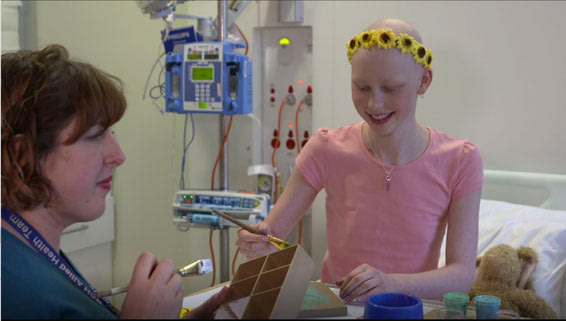

Smart Solutions
Financial support from QNRF also led to a new weapon being developed in the fight against the “silent killer” of oil and gas pipelines – corrosion.
The smart corrosion sensor, designed for early detection of metal degradation, was created by academic and industrial experts from the Qatar Shell Research and Technology Center (QSRTC) – a tenant of Qatar Science & Technology Park (QSTP), part of Qatar Foundation Research, Development, and Innovation – Qatar University, and Imperial College London.
“Internal corrosion in pipelines, if not detected early, can affect the economics of production and pressing, threaten lives, and cause long-lasting environmental damage,” said Dr. Abitha Ramesh, Corrosion Researcher at QSRTC.
“This novel online sensor will play a significant role in ensuring the structural integrity of oil and gas pipelines not just in Qatar, but also worldwide.”
And QNRF funding enabled researchers from QF partner university Texas A&M University at Qatar, its US home campus, and QF’s Sidra Medicine to advance an Artificial Intelligence-based app with the potential to be an inexpensive and non-invasive tool for detecting low blood sugar in Type 1 diabetes patients to the proof-of-concept stage.
Financial support from QNRF also led to a new weapon being developed in the fight against the “silent killer” of oil and gas pipelines – corrosion.
The smart corrosion sensor, designed for early detection of metal degradation, was created by academic and industrial experts from the Qatar Shell Research and Technology Center (QSRTC) – a tenant of Qatar Science & Technology Park (QSTP), part of Qatar Foundation Research, Development, and Innovation – Qatar University, and Imperial College London.
“Internal corrosion in pipelines, if not detected early, can affect the economics of production and pressing, threaten lives, and cause long-lasting environmental damage,” said Dr. Abitha Ramesh, Corrosion Researcher at QSRTC.
“This novel online sensor will play a significant role in ensuring the structural integrity of oil and gas pipelines not just in Qatar, but also worldwide.”
And QNRF funding enabled researchers from QF partner university Texas A&M University at Qatar, its US home campus, and QF’s Sidra Medicine to advance an Artificial Intelligence-based app with the potential to be an inexpensive and non-invasive tool for detecting low blood sugar in Type 1 diabetes patients to the proof-of-concept stage.
This novel online sensor will play a significant role in ensuring the structural integrity of oil and gas pipelines not just in Qatar, but also worldwide
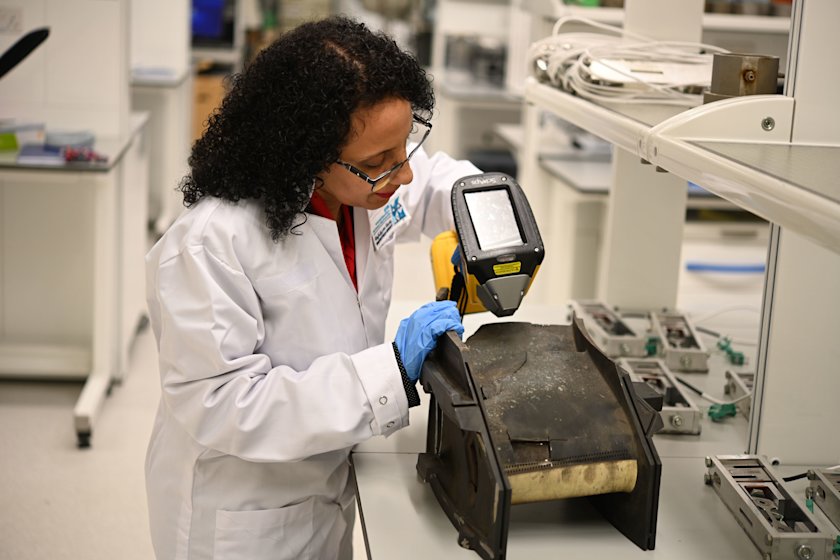
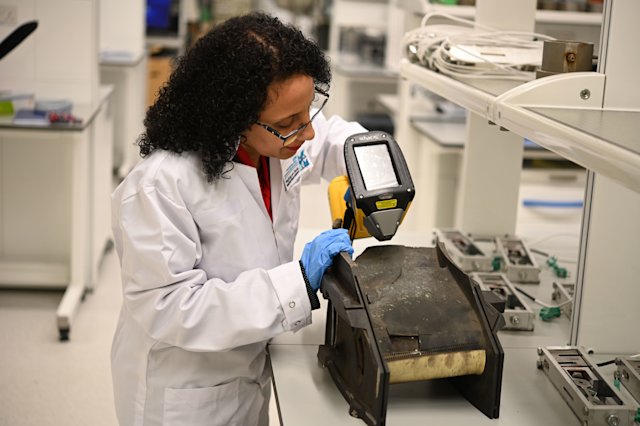
Platforms for Innovation
A boost for Qatar’s technology innovators and entrepreneurs arrived in April, through a partnership between QSTP and Doha-based Innovation Café.
As an innovation and design thinking studio, the Café supports new Qatari businesses launch and thrive. The collaboration with QSTP is strengthening platforms for innovators – such as incubator events, bootcamps, hackathons, and pitching sessions – and increasing access to infrastructure, mentoring, funding, and investment.
“Being part of a nationwide ecosystem of research, development, innovation, and entrepreneurship, it is important that we identify synergies and leverage them, to effectively support our tech innovators and entrepreneurs to address local market needs while also making a global impact,” said QSTP Executive Director Yousef Al-Salehi.
Meanwhile, QF’s global healthcare initiative the World Innovation Summit for Health (WISH) partnered with BMJ Innovations – a specialist online journal focusing on emerging digital health, medical devices, process, and system innovations – to amplify the visibility of original health research and access to health innovation practices.
“We believe it will contribute to shaping the concept of how health innovation is perceived around the world,” said Nicholas Bradshaw, WISH’s Director of Outreach and Partnerships.
A boost for Qatar’s technology innovators and entrepreneurs arrived in April, through a partnership between QSTP and Doha-based Innovation Café.
As an innovation and design thinking studio, the Café supports new Qatari businesses launch and thrive. The collaboration with QSTP is strengthening platforms for innovators – such as incubator events, bootcamps, hackathons, and pitching sessions – and increasing access to infrastructure, mentoring, funding, and investment.
“Being part of a nationwide ecosystem of research, development, innovation, and entrepreneurship, it is important that we identify synergies and leverage them, to effectively support our tech innovators and entrepreneurs to address local market needs while also making a global impact,” said QSTP Executive Director Yousef Al-Salehi.
Meanwhile, QF’s global healthcare initiative the World Innovation Summit for Health (WISH) partnered with BMJ Innovations – a specialist online journal focusing on emerging digital health, medical devices, process, and system innovations – to amplify the visibility of original health research and access to health innovation practices.
“We believe it will contribute to shaping the concept of how health innovation is perceived around the world,” said Nicholas Bradshaw, WISH’s Director of Outreach and Partnerships.
QSTP is offering $50m over five years to support startups
Supporting innovation across the healthcare system is more important than ever. Our new partnership with @WISHQatar helps us do that and improve patient outcomes through @BMJ_innovations @ashleymckimm https://t.co/YFo1yDLhKf pic.twitter.com/ubvP5eNHJS
— BMJ (@bmj_company) April 19, 2021
Solutions Through the Screen
Harnessing the power of film to explore how global challenges can be addressed is at the core of a new initiative launched by QF’s Doha Debates and a top international arts organization in April.
Solutions Cinema was created by the QF initiative and Points North Institute – the producer of the UK’s famed Camden International Film Festival – to help spark social change through storytelling, beginning with a month-long series of free virtual film screenings and summit-style interactive discussions.
“This initiative will be extraordinary, bringing together filmmakers, educators, and students for thoughtful dialogue and debate about how to better use the medium of film in the pursuit of solutions to some of humanity’s most challenging issues,” said Doha Debates’ Managing Director, Amjad Atallah.
The second season of Doha Debates’ Course Correction podcast series also got under way in April, examining polarizing and divisive issues ranging from lockdown politics to ‘cancel culture’, and looking to overcome differences and reach consensus.
Harnessing the power of film to explore how global challenges can be addressed is at the core of a new initiative launched by QF’s Doha Debates and a top international arts organization in April.
Solutions Cinema was created by the QF initiative and Points North Institute – the producer of the UK’s famed Camden International Film Festival – to help spark social change through storytelling, beginning with a month-long series of free virtual film screenings and summit-style interactive discussions.
“This initiative will be extraordinary, bringing together filmmakers, educators, and students for thoughtful dialogue and debate about how to better use the medium of film in the pursuit of solutions to some of humanity’s most challenging issues,” said Doha Debates’ Managing Director, Amjad Atallah.
The second season of Doha Debates’ Course Correction podcast series also got under way in April, examining polarizing and divisive issues ranging from lockdown politics to ‘cancel culture’, and looking to overcome differences and reach consensus.
Around 83m people watched Doha Debates’ live debates in 2021
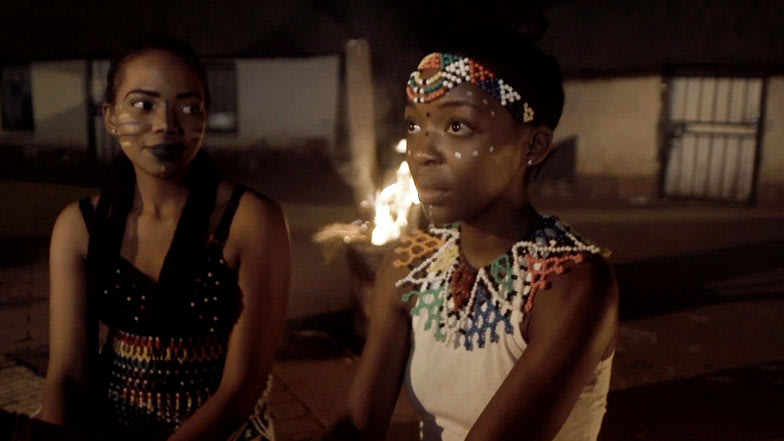
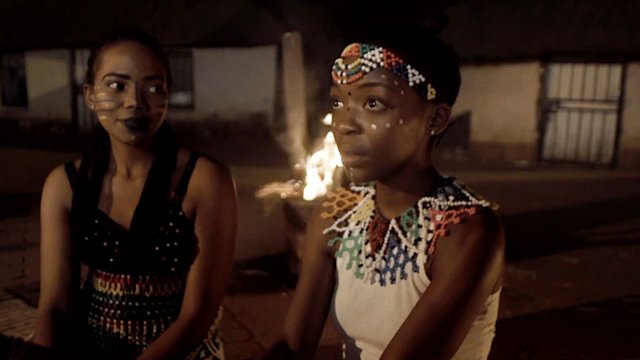
A Wheel of Knowledge
Having helped English-speakers around the world learn Arabic for the past decade, a Qatar Foundation International (QFI) tool that “demystifies” the language reached a new audience.
The Wheel of Letters, or Madar Al-Huruf – which QFI calls the Q-Wheel – is a rotatable disc that matches Arabic letters and their sounds to similar-sounding English letters and combinations, making it ideal for those who are new to the Arabic language to begin learning by spelling their names in Arabic.
It has been widely used in art classes for calligraphy and to introduce Arabic cultural elements to subjects such as social sciences and history. And its impact led to a new version of the Q-Wheel – which is available as a physical tool and an award-winning app – being developed by QFI for German speakers.
Nour Jandali, Global World Languages Chair and IB Arabic Teacher at Cholla High School in Tucson, Arizona, is among the Q-Wheel’s users, and explained: “It’s an opportunity for new language learners to appreciate the beauty of the Arabic language by overcoming one of its most prevalent stereotypes – that it is a hard one to learn.”
Having helped English-speakers around the world learn Arabic for the past decade, a Qatar Foundation International (QFI) tool that “demystifies” the language reached a new audience.
The Wheel of Letters, or Madar Al-Huruf – which QFI calls the Q-Wheel – is a rotatable disc that matches Arabic letters and their sounds to similar-sounding English letters and combinations, making it ideal for those who are new to the Arabic language to begin learning by spelling their names in Arabic.
It has been widely used in art classes for calligraphy and to introduce Arabic cultural elements to subjects such as social sciences and history. And its impact led to a new version of the Q-Wheel – which is available as a physical tool and an award-winning app – being developed by QFI for German speakers.
Nour Jandali, Global World Languages Chair and IB Arabic Teacher at Cholla High School in Tucson, Arizona, is among the Q-Wheel’s users, and explained: “It’s an opportunity for new language learners to appreciate the beauty of the Arabic language by overcoming one of its most prevalent stereotypes – that it is a hard one to learn.”
It’s an opportunity for new language learners to appreciate the beauty of the Arabic language
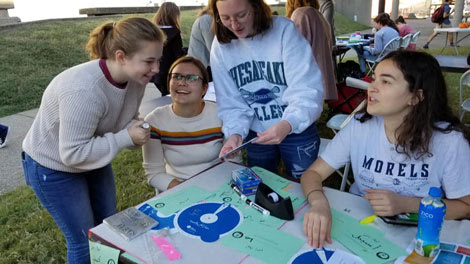

How the Show Went On
After a 10-year hiatus, a performing arts tradition returned to QF in 2021 – through a Broadway-style musical called SHOWTIME!
Featuring 75 students and staff from schools under QF’s Pre-University Education (PUE), the show featured renditions of musical numbers including songs from Matilda and Mary Poppins in Education City settings, and came to life with the support of creative team Steve and Jane Griffiths, West End choreographer Christopher Piper, and QF’s Qatar Philharmonic Orchestra.
When COVID-19 struck, plans for a SHOWTIME! theater performance switched to a virtual approach, with five professional music videos being made. And in April, a documentary about the making of SHOWTIME! was premiered.
“We believe that, for students, being part of a performing arts experience of such a scale instills them with confidence, creativity, cooperation, and concentration, as well as providing the building blocks for an appreciation of the arts,” said Yara Darwish, PUE’s Head of Extramural Programs.
And SHOWTIME! even took a choreographer of Piper’s experience by surprise. “I didn’t really know what to expect,” he said. “The growth, determination, and confidence these students have gained is incredible.”
After a 10-year hiatus, a performing arts tradition returned to QF in 2021 – through a Broadway-style musical called SHOWTIME!
Featuring 75 students and staff from schools under QF’s Pre-University Education (PUE), the show featured renditions of musical numbers including songs from Matilda and Mary Poppins in Education City settings, and came to life with the support of creative team Steve and Jane Griffiths, West End choreographer Christopher Piper, and QF’s Qatar Philharmonic Orchestra.
When COVID-19 struck, plans for a SHOWTIME! theater performance switched to a virtual approach, with five professional music videos being made. And in April, a documentary about the making of SHOWTIME! was premiered.
“We believe that, for students, being part of a performing arts experience of such a scale instills them with confidence, creativity, cooperation, and concentration, as well as providing the building blocks for an appreciation of the arts,” said Yara Darwish, PUE’s Head of Extramural Programs.
And SHOWTIME! even took a choreographer of Piper’s experience by surprise. “I didn’t really know what to expect,” he said. “The growth, determination, and confidence these students have gained is incredible.”
Being part of a performing arts experience of such a scale instills them with confidence, creativity, cooperation, and concentration
